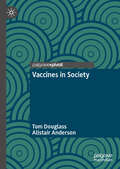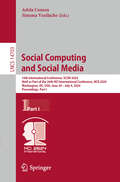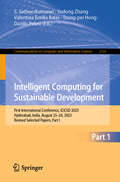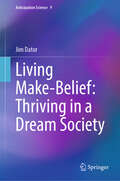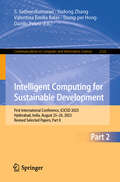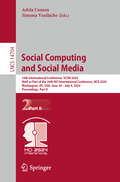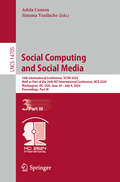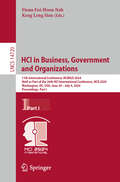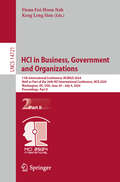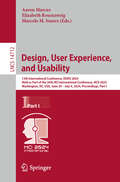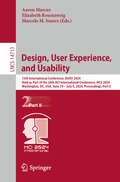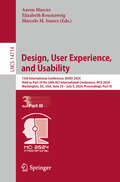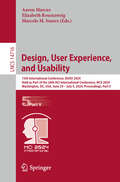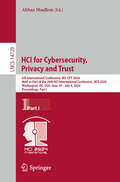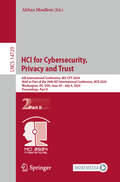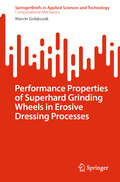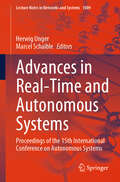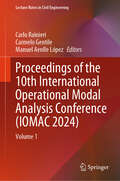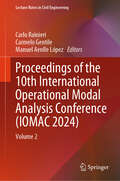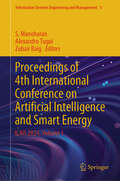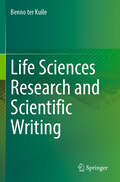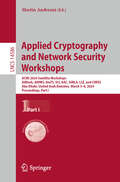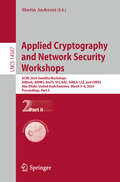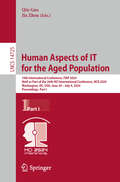- Table View
- List View
Vaccines in Society
by Tom Douglass Alistair AndersonThis book argues that the social story of vaccination has commonly been told through the lens of vaccine hesitancy and the myriad challenges that this broad issue poses for public health and the mitigation of preventable harms. Consequently, less sustained analytical attention has been given by social scientists to the rich tapestry of other social and political dimensions of vaccines and consequences of vaccination. This book begins from the premise that a broader approach to the technology and intervention of vaccination is required and that further social scientific analysis is needed of how societies produce and preserve high levels of vaccination coverage, as well as the social and political challenges or threats – beyond vaccine hesitancy – that may harm or restrict it. To achieve this, the book assembles and reframes evidence from medical sociology, science and technology studies, public health, health geography, and the medical humanities. In doing so it looks across the ‘immunisation social order’ by analysing dimensions that have thus far been neglected or under-scrutinised, revealing not only the functioning of and central challenges to the immunisation social order, but also bringing into sharp focus the social and political nature of vaccines themselves.
Social Computing and Social Media: 16th International Conference, SCSM 2024, Held as Part of the 26th HCI International Conference, HCII 2024, Washington, DC, USA, June 29–July 4, 2024, Proceedings, Part I (Lecture Notes in Computer Science #14703)
by Adela Coman Simona VasilacheThis book constitutes the refereed proceedings of the 16th International Conference on Social Computing and Social Media, SCSM 2024, held as part of the 26th HCI International Conference, HCII 2024, which took place in Washington, DC, USA, during June 29–July 4, 2024. The total of 1271 papers and 309 posters included in the HCII 2024 proceedings was carefully reviewed and selected from 5108 submissions. The SCSM 2024 proceedings were organized in the following topical sections: Part I: Designing, developing and evaluating social media; user experience and user behavior in social media; AI and language models in social media; Part II: Social media in learning, education and culture; social media in business and ecommerce; Part III: Computer-mediated communication; social media for community, society and democracy.
Intelligent Computing for Sustainable Development: First International Conference, ICICSD 2023, Hyderabad, India, August 25–26, 2023, Revised Selected Papers, Part I (Communications in Computer and Information Science #2121)
by Tzung-Pei Hong Valentina Emilia Balas Danilo Pelusi Yudong Zhang S. SatheeskumaranThe two-volume proceedings set CCIS 2121 and 2122 constitutes the refereed proceedings of the First International Conference on Intelligent Computing for Sustainable Development, ICICSD 2023, which took place in Hyderabad, India, during August 25–26, 2023. The 46 papers included in these proceedings were carefully reviewed and selected from 138 submissions. They focus on digital healthcare, renewable energy, smart cities, digital farming, and autonomous systems.
Living Make-Belief: Thriving in a Dream Society (Anticipation Science #9)
by Jim DatorThis book shows how multiple developments have caused the world to move from “an information society” to a “dream society”. Ongoing social and technological forces are pushing us from a world of words, rationality, and truth into a world of images, performance, and make-belief. Rather than deny or reject this transformation, this book argues that one should understand and embrace it as waves of new futures that the world must strive to surf for fame and fun. As a political scientist and futurist, the author also offers hints of new goals and forms of governance fit for a dream society, as he demonstrates that all current systems are ineffective and dangerously obsolete. This book is of great interest to political philosophers, futures scientists, sociologists, and those interested in cultural studies.
Intelligent Computing for Sustainable Development: First International Conference, ICICSD 2023, Hyderabad, India, August 25–26, 2023, Revised Selected Papers, Part II (Communications in Computer and Information Science #2122)
by Tzung-Pei Hong Valentina Emilia Balas Danilo Pelusi Yudong Zhang S. SatheeskumaranThe two-volume proceedings set CCIS 2121 and 2122 constitutes the refereed proceedings of the First International Conference on Intelligent Computing for Sustainable Development, ICICSD 2023, which took place in Hyderabad, India, during August 25–26, 2023. The 46 papers included in these proceedings were carefully reviewed and selected from 138 submissions. They focus on digital healthcare, renewable energy, smart cities, digital farming, and autonomous systems.
Social Computing and Social Media: 16th International Conference, SCSM 2024, Held as Part of the 26th HCI International Conference, HCII 2024, Washington, DC, USA, June 29–July 4, 2024, Proceedings, Part II (Lecture Notes in Computer Science #14704)
by Adela Coman Simona VasilacheThis book constitutes the refereed proceedings of the 16th International Conference on Social Computing and Social Media, SCSM 2024, held as part of the 26th HCI International Conference, HCII 2024, which took place in Washington, DC, USA, during June 29–July 4, 2024. The total of 1271 papers and 309 posters included in the HCII 2024 proceedings was carefully reviewed and selected from 5108 submissions. The SCSM 2024 proceedings were organized in the following topical sections: Part I: Designing, developing and evaluating social media; user experience and user behavior in social media; AI and language models in social media; Part II: Social media in learning, education and culture; social media in business and ecommerce; Part III: Computer-mediated communication; social media for community, society and democracy.
Social Computing and Social Media: 16th International Conference, SCSM 2024, Held as Part of the 26th HCI International Conference, HCII 2024, Washington, DC, USA, June 29–July 4, 2024, Proceedings, Part III (Lecture Notes in Computer Science #14705)
by Adela Coman Simona VasilacheThis book constitutes the refereed proceedings of the 16th International Conference on Social Computing and Social Media, SCSM 2024, held as part of the 26th HCI International Conference, HCII 2024, which took place in Washington, DC, USA, during June 29–July 4, 2024. The total of 1271 papers and 309 posters included in the HCII 2024 proceedings was carefully reviewed and selected from 5108 submissions. The SCSM 2024 proceedings were organized in the following topical sections: Part I: Designing, developing and evaluating social media; user experience and user behavior in social media; AI and language models in social media; Part II: Social media in learning, education and culture; social media in business and ecommerce; Part III: Computer-mediated communication; social media for community, society and democracy.
HCI in Business, Government and Organizations: 11th International Conference, HCIBGO 2024, Held as Part of the 26th HCI International Conference, HCII 2024, Washington, DC, USA, June 29 – July 4, 2024, Proceedings, Part I (Lecture Notes in Computer Science #14720)
by Fiona Fui-Hoon Nah Keng Leng SiauThis two-volume set of HCIBGO 2024 constitutes the refereed proceedings of the 11h International Conference on HCI in Business, Government and Organizations, held as part of the 26th International Conference, HCI International 2024, which took place in from June 29 - July 4, 2024 in Washington DC, USA. Two volumes of the HCII 2024 proceedings are dedicated to this year’s edition of the HCIBGO conference. The first covers topics related to Digital Commerce and Marketing, Artificial Intelligence in Business, and Workplace, Well-being and Productivity. The second focuses on topics related to Teleworking and Virtual Collaboration, and Improving User Experience and Service Efficiency.
HCI in Business, Government and Organizations: 11th International Conference, HCIBGO 2024, Held as Part of the 26th HCI International Conference, HCII 2024, Washington, DC, USA, June 29 – July 4, 2024, Proceedings, Part II (Lecture Notes in Computer Science #14721)
by Fiona Fui-Hoon Nah Keng Leng SiauThis two-volume set of HCIBGO 2024 constitutes the refereed proceedings of the 11h International Conference on HCI in Business, Government and Organizations, held as part of the 26th International Conference, HCI International 2024, which took place in from June 29 - July 4, 2024 in Washington DC, USA. Two volumes of the HCII 2024 proceedings are dedicated to this year’s edition of the HCIBGO conference. The first covers topics related to Digital Commerce and Marketing, Artificial Intelligence in Business, and Workplace, Well-being and Productivity. The second focuses on topics related to Teleworking and Virtual Collaboration, and Improving User Experience and Service Efficiency.
Design, User Experience, and Usability: 13th International Conference, DUXU 2024, Held as Part of the 26th HCI International Conference, HCII 2024, Washington, DC, USA, June 29–July 4, 2024, Proceedings, Part I (Lecture Notes in Computer Science #14712)
by Aaron Marcus Marcelo M. Soares Elizabeth RosenzweigThis five-volume set LNCS 14712-14716 constitutes the refereed proceedings of the 13th International Conference on Design, User Experience, and Usability, DUXU 2024, held as part of the 26th International Conference, HCI International 2024, in Washington, DC, USA, during June 29 – July 4, 2024. The total of 1271 papers and 309 posters included in the HCII 2024 proceedings was carefully reviewed and selected from 5108 submissions. The DUXU 2024 proceedings were organized in the following topical sections: Part I: Information Visualization and Interaction Design; Usability Testing and User Experience Evaluation. Part II: Designing Interactions for Intelligent Environments; Automotive Interactions and Smart Mobility Solutions; Speculative Design and Creativity. Part III: User Experience Design for Inclusion and Diversity; Human-Centered Design for Social Impact. Part IV: Designing Immersive Experiences across Contexts; Technology, Design, and Learner Engagement; User Experience in Tangible and Intangible Cultural Heritage. Part V: Innovative Design for Enhanced User Experience; Innovations in Product and Service Design.
Design, User Experience, and Usability: 13th International Conference, DUXU 2024, Held as Part of the 26th HCI International Conference, HCII 2024, Washington, DC, USA, June 29–July 4, 2024, Proceedings, Part II (Lecture Notes in Computer Science #14713)
by Aaron Marcus Marcelo M. Soares Elizabeth RosenzweigThis five-volume set LNCS 14712-14716 constitutes the refereed proceedings of the 13th International Conference on Design, User Experience, and Usability, DUXU 2024, held as part of the 26th International Conference, HCI International 2024, in Washington, DC, USA, during June 29 – July 4, 2024. The total of 1271 papers and 309 posters included in the HCII 2024 proceedings was carefully reviewed and selected from 5108 submissions. The DUXU 2024 proceedings were organized in the following topical sections: Part I: Information Visualization and Interaction Design; Usability Testing and User Experience Evaluation. Part II: Designing Interactions for Intelligent Environments; Automotive Interactions and Smart Mobility Solutions; Speculative Design and Creativity. Part III: User Experience Design for Inclusion and Diversity; Human-Centered Design for Social Impact. Part IV: Designing Immersive Experiences across Contexts; Technology, Design, and Learner Engagement; User Experience in Tangible and Intangible Cultural Heritage. Part V: Innovative Design for Enhanced User Experience; Innovations in Product and Service Design.
Design, User Experience, and Usability: 13th International Conference, DUXU 2024, Held as Part of the 26th HCI International Conference, HCII 2024, Washington, DC, USA, June 29 – July 4, 2024, Proceedings, Part III (Lecture Notes in Computer Science #14714)
by Aaron Marcus Marcelo M. Soares Elizabeth RosenzweigThis five-volume set LNCS 14712-14716 constitutes the refereed proceedings of the 13th International Conference on Design, User Experience, and Usability, DUXU 2024, held as part of the 26th International Conference, HCI International 2024, in Washington, DC, USA, during June 29 – July 4, 2024. The total of 1271 papers and 309 posters included in the HCII 2024 proceedings was carefully reviewed and selected from 5108 submissions. The DUXU 2024 proceedings were organized in the following topical sections: Part I: Information Visualization and Interaction Design; Usability Testing and User Experience Evaluation. Part II: Designing Interactions for Intelligent Environments; Automotive Interactions and Smart Mobility Solutions; Speculative Design and Creativity. Part III: User Experience Design for Inclusion and Diversity; Human-Centered Design for Social Impact. Part IV: Designing Immersive Experiences across Contexts; Technology, Design, and Learner Engagement; User Experience in Tangible and Intangible Cultural Heritage. Part V: Innovative Design for Enhanced User Experience; Innovations in Product and Service Design.
Design, User Experience, and Usability: 13th International Conference, DUXU 2024, Held as Part of the 26th HCI International Conference, HCII 2024, Washington, DC, USA, June 29 – July 4, 2024, Proceedings, Part V (Lecture Notes in Computer Science #14716)
by Aaron Marcus Marcelo M. Soares Elizabeth RosenzweigThis five-volume set LNCS 14712-14716 constitutes the refereed proceedings of the 13th International Conference on Design, User Experience, and Usability, DUXU 2024, held as part of the 26th International Conference, HCI International 2024, in Washington, DC, USA, during June 29 – July 4, 2024. The total of 1271 papers and 309 posters included in the HCII 2024 proceedings was carefully reviewed and selected from 5108 submissions. The DUXU 2024 proceedings were organized in the following topical sections: Part I: Information Visualization and Interaction Design; Usability Testing and User Experience Evaluation. Part II: Designing Interactions for Intelligent Environments; Automotive Interactions and Smart Mobility Solutions; Speculative Design and Creativity. Part III: User Experience Design for Inclusion and Diversity; Human-Centered Design for Social Impact. Part IV: Designing Immersive Experiences across Contexts; Technology, Design, and Learner Engagement; User Experience in Tangible and Intangible Cultural Heritage. Part V: Innovative Design for Enhanced User Experience; Innovations in Product and Service Design.
HCI for Cybersecurity, Privacy and Trust: 6th International Conference, HCI-CPT 2024, Held as Part of the 26th HCI International Conference, HCII 2024, Washington, DC, USA, June 29 – July 4, 2024, Proceedings, Part I (Lecture Notes in Computer Science #14728)
by Abbas MoallemThis proceedings, HCI-CPT 2024, constitutes the refereed proceedings of the 6th International Conference on Cybersecurity, Privacy and Trust, held as Part of the 26th International Conference, HCI International 2024, which took place from June 29 - July 4, 2024 in Washington DC, USA. Two volumes of the HCII 2024 proceedings are dedicated to this year’s edition of the HCI-CPT Conference. The first focuses on topics related to Cyber Hygiene, User Behavior and Security Awareness, and User Privacy and Security Acceptance. The second focuses on topics related to Cybersecurity Education and Training, and Threat Assessment and Protection.
HCI for Cybersecurity, Privacy and Trust: 6th International Conference, HCI-CPT 2024, Held as Part of the 26th HCI International Conference, HCII 2024, Washington, DC, USA, June 29–July 4, 2024, Proceedings, Part II (Lecture Notes in Computer Science #14729)
by Abbas MoallemThis proceedings, HCI-CPT 2024, constitutes the refereed proceedings of the 6th International Conference on Cybersecurity, Privacy and Trust, held as Part of the 26th International Conference, HCI International 2024, which took place from June 29 - July 4, 2024 in Washington DC, USA. Two volumes of the HCII 2024 proceedings are dedicated to this year’s edition of the HCI-CPT Conference. The first focuses on topics related to Cyber Hygiene, User Behavior and Security Awareness, and User Privacy and Security Acceptance. The second focuses on topics related to Cybersecurity Education and Training, and Threat Assessment and Protection.
Performance Properties of Superhard Grinding Wheels in Erosive Dressing Processes (SpringerBriefs in Applied Sciences and Technology)
by Marcin GołąbczakThis book presents a scientific study covering all issues related to the development and assessment of the functional properties of superhard grinding wheels with a metal bond. Abrasive grinding, especially with superhard grinding wheels, is still the basic method for efficient and accurate shaping of workpieces, especially from materials with high hardness and durability. Meeting the high requirements placed on grinding processes, with regard to obtaining high dimensional-shape accuracy and the desired quality of the surface layer as well as repeatability of grinding results, requires the use of rational methods for shaping the cutting surface of grinding wheels (CSGW) in dressing processes. Individual chapters of the monograph include • Characteristics of superhard grinding wheels including properties of superhard abrasive materials, metal binders, construction, and marking of technical characteristics of grinding wheels and areas of their application, • Parameters and methods for assessing the performance properties of superhard grinding wheels, including direct and indirect assessment parameters and economic aspects of assessing the dressing of superhard grinding wheels, • Characteristics of dressing methods for superhard grinding wheels, including conventional methods and erosive dressing methods. The erosive dressing methods include dressing with a high-pressure stream of liquids, liquids and abrasives, laser dressing and electrochemical, electroerosive and hybrid methods. • Results of own research on electrochemical and electroerosion dressing processes, including mathematical modeling of these dressing processes and experimental research. The book meets the needs of both scientific and technical staff, providing knowledge about modern methods of shaping CPS of superhard grinding wheels. It will be an important reference in the libraries of technical universities as a research aid for students, technical staff, and research and teaching staff.
Beyond Houses: Architectural Thinking and Practice for Climate, Disaster and Forced Displacement Crises (The Urban Book Series)
by A. Nuno Martins Carmen Mendoza-Arroyo Liliane Hobeica Jorge León Adib HobeicaThis book delves into the complexities of urban crises, focusing on the efforts of researchers and practitioners who confront precarious housing and forced displacement. Originating from the 8th International Conference on Building Resilience (convened in November 2018 in Lisbon, Portugal), this book examines challenges across diverse contexts and geographies, including Chile, India, Kenya, Mexico, Portugal, and Syria. Structured in three parts, the book's 12 chapters address disaster prevention and recovery, humanitarian architecture, and issues related to housing, migration, and urban forced displacement. The narratives emphasize vulnerabilities, community-driven design, and cross-cultural perspectives, comprehensively reviewing global urban planning, slum upgrading, and incremental housing strategies. The contributions engage readers with practical insights for mitigating urban vulnerability and intellectual analyses that consider the complexities of life amid systemic injustices. Ultimately, the authors suggest integrating architectural practice with social work within communities to address intricate urban housing challenges.
Advances in Real-Time and Autonomous Systems: Proceedings of the 15th International Conference on Autonomous Systems (Lecture Notes in Networks and Systems #1009)
by Herwig Unger Marcel SchaibleThe 15th International conference on "Autonomous Systems" is addressing an important topic for computing systems and communication networks due to increasingly complex environments they are working in. Therefore, this conferences addresses methods and solutions enabling such systems to independently adapt themselves to changed environmental conditions, are able to learn from different sources and to process external requests dependably, safely and timely. The solutions presented here range from hardware to system design to individual applications. The book contains the results of the researchers presented at this conference, which is supported by GI (German Society of informatics) and other organisations Real-Time Systems Expert Committees. The target audience is students and researchers in computer science and automation technology, engineers, programmers and users of automation and communication systems.
Proceedings of the 10th International Operational Modal Analysis Conference: Volume 1 (Lecture Notes in Civil Engineering #514)
by Carlo Rainieri Carmelo Gentile Manuel Aenlle LópezThis volume gathers the latest advances and innovations in the field of operational modal analysis and structural health monitoring, as presented at the 10th International Operational Modal Analysis Conference (IOMAC), held in Naples, Italy on May 22-24, 2024. The contributions cover a diverse range of topics, including AI for data interpretation, automatic modal parameter estimation, Digital Twin, modal testing methods, instrumentation and case studies, model correlation and updating, modal-based SHM, modal mass estimation. Selected by means of a rigorous peer-review process, they will spur novel research directions and foster future multidisciplinary collaborations.
Proceedings of the 10th International Operational Modal Analysis Conference: Volume 2 (Lecture Notes in Civil Engineering #515)
by Carlo Rainieri Carmelo Gentile Manuel Aenlle LópezThis volume gathers the latest advances and innovations in the field of operational modal analysis and structural health monitoring, as presented at the 10th International Operational Modal Analysis Conference (IOMAC), held in Naples, Italy on May 22-24, 2024. The contributions cover a diverse range of topics, including AI for data interpretation, automatic modal parameter estimation, Digital Twin, modal testing methods, instrumentation and case studies, model correlation and updating, modal-based SHM, modal mass estimation. Selected by means of a rigorous peer-review process, they will spur novel research directions and foster future multidisciplinary collaborations.
Proceedings of 4th International Conference on Artificial Intelligence and Smart Energy: ICAIS 2024, Volume 1 (Information Systems Engineering and Management #3)
by Zubair Baig Alexandru Tugui S. ManoharanThis book presents a comprehensive collection of research chapters focusing on innovative solutions to energy and sustainability challenges. It reflects the collaborative efforts of researchers worldwide, showcasing novel approaches to complex problems. Topics discussed range from securing cyber-physical systems to revolutionizing healthcare with AI and robotics, emphasizing sustainable research. The book emphasizes smart and sustainable energy solutions, highlighting advancements in solar panel efficiency, fault analysis, and fuzzy-controlled converters for grid-tied photovoltaic systems. Additionally, it explores AI's transformative potential in water solutions, agriculture, and renewable energy technologies across domains like smart cities, transportation, and healthcare. The insights shared aim to inspire further research, foster discussions, and drive real-world impact toward a resilient, inclusive, and sustainable future. · Discusses issues and offers sustainable solutions to meet the challenges faced by today's economy and industry. · Presents recent research in the sustainable transformation of engineering and technological systems. · Serves as a valuable resource for both academic researchers and industry practitioners interested in Artificial Intelligence (AI) and smart energy sectors.
Life Sciences Research and Scientific Writing
by Benno ter KuileScientific writing is a trade that can and must be learned and not a form of art that is limited to the talented. The real constraint for writing a good scientific article is most of the time not the usage of the English language, but the conversion of outcomes of a set of experiments into a coherent and convincing scientific story. This book is designed to guide junior scientists in the Life Sciences writing their thesis and first manuscripts, along this uphill struggle. All aspects of building up and publishing a forceful scientific narrative are covered, from designing experiments to dealing with the reviewers’ comments. This book takes you step by step through the process of writing a paper. It starts by discussing how to collect and organize data and make an outline. The actual writing starts with the Results section, as this is the heart of any research paper. The Discussion interprets your data in the framework of the existing literature and explains the novel insights you obtained. The Introduction is written to pose the questions that are answered in the Discussion and give the necessary background information. It is written after the Results and Discussion to make sure it is a perfect match. The M&M is the easiest to write. A good abstract is essential for attracting readers. How to write that is described in detail. The title is the last piece of the puzzle. The book contains many practical examples that explain the general principles of good writing. These examples are all from the Life Sciences and so are the anecdotes that illustrate the concepts, making the information directly applicable. All kinds of tips and suggestions are provided for improving readability and accessibility of your manuscript, thus making it easier acceptable. In addition, background information on the basics of science is supplied that helps to avoid common mistakes that cause rejection of manuscripts that report on otherwise good science.
Applied Cryptography and Network Security Workshops: ACNS 2024 Satellite Workshops, AIBlock, AIHWS, AIoTS, SCI, AAC, SiMLA, LLE, and CIMSS, Abu Dhabi, United Arab Emirates, March 5–8, 2024, Proceedings, Part I (Lecture Notes in Computer Science #14586)
by Martin AndreoniThis two-volume set LNCS 14586-14587 constitutes the proceedings of eight Satellite Workshops held in parallel with the 22nd International Conference on Applied Cryptography and Network Security, ACNS 2024, held in Abhu Dabhi, United Arab Emirates, during March 5-8, 2024. The 33 full papers and 11 poster papers presented in this volume were carefully reviewed and selected from 62 submissions. They stem from the following workshops: 6th ACNS Workshop on Application Intelligence and Blockchain Security (AIBlock 2024). 5th ACNS Workshop on Artificial Intelligence in Hardware Security (AIHWS 2024). 6th ACNS Workshop on Artificial Intelligence and Industrial IoT Security (AIoTS 2024). 5th ACNS Workshop on Secure Cryptographic Implementation (SCI 2024). 1st Workshop on Advances in Asymmetric Cryptanalysis (AAC 2024). 6th ACNS Workshop on Security in Machine Learning and its Applications (SiMLA 2024). 1st Workshop on Low-Latency Encryption (LLE 2024). 4th ACNS Workshop on Critical Infrastructure and Manufacturing System Security (CIMSS 2024).
Applied Cryptography and Network Security Workshops: ACNS 2024 Satellite Workshops, AIBlock, AIHWS, AIoTS, SCI, AAC, SiMLA, LLE, and CIMSS, Abu Dhabi, United Arab Emirates, March 5–8, 2024, Proceedings, Part II (Lecture Notes in Computer Science #14587)
by Martin AndreoniThis two-volume set LNCS 14586-14587 constitutes the proceedings of eight Satellite Workshops held in parallel with the 22nd International Conference on Applied Cryptography and Network Security, ACNS 2024, held in Abhu Dabhi, United Arab Emirates, during March 5-8, 2024. The 33 full papers and 11 poster papers presented in this volume were carefully reviewed and selected from 62 submissions. They stem from the following workshops: 6th ACNS Workshop on Application Intelligence and Blockchain Security (AIBlock 2024). 5th ACNS Workshop on Artificial Intelligence in Hardware Security (AIHWS 2024). 6th ACNS Workshop on Artificial Intelligence and Industrial IoT Security (AIoTS 2024). 5th ACNS Workshop on Secure Cryptographic Implementation (SCI 2024). 1st Workshop on Advances in Asymmetric Cryptanalysis (AAC 2024). 6th ACNS Workshop on Security in Machine Learning and its Applications (SiMLA 2024). 1st Workshop on Low-Latency Encryption (LLE 2024). 4th ACNS Workshop on Critical Infrastructure and Manufacturing System Security (CIMSS 2024).
Human Aspects of IT for the Aged Population: 10th International Conference, ITAP 2024, Held as Part of the 26th HCI International Conference, HCII 2024, Washington, DC, USA, June 29–July 4, 2024, Proceedings, Part I (Lecture Notes in Computer Science #14725)
by Jia Zhou Qin GaoThis two-volume set LNCS 14725-14726 constitutes the thoroughly refereed proceedings of the 10th International Conference on Human Aspects of IT for the Aged Population (ITAP 2024), held as part of the 26th International Conference on Human-Computer Interaction, HCI International 2024 (HCII 2024), was held as a hybrid event in Washington DC, USA, during June/July 2024. The total of 1271 papers and 309 posters included in the HCII 2023 proceedings was carefully reviewed and selected from 5108 submissions. The ITAP 2024 conference offers a broad range of relevant disciplines and domains to exchange 1) research contributions on older people's abilities and competencies, needs and requirements, and attitudes and behavioral patterns in relation to IT use; 2) innovative ideas, practices, and experiences related to the design, operation, and evaluation of IT applications, systems, and services for older people.
